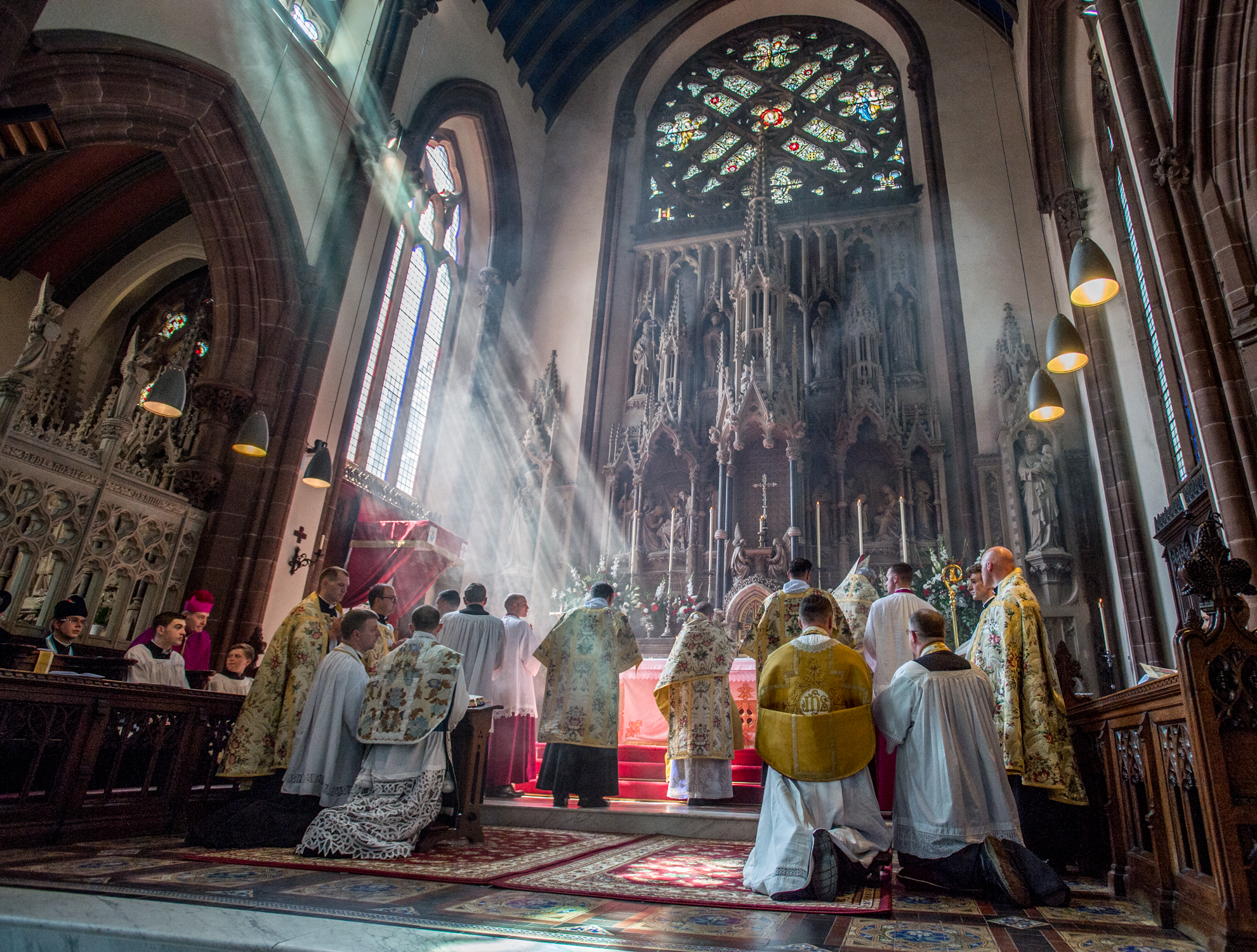Not this year, but…
It nearly became a tradition to have priestly ordinations at St Mary’s Warrington. Last year was Fr Seth Phipps’, the year before Frs Sanetra and Stewart’s.

This year however, we have instead the first wedding among members of our congregation (Sat. midday 22 June 2019). This same weekend, our community is blessed with further sacramental graces: not only two new spouses, but also six new adult Catholics (an over two-hour ceremony with ritual prostrations and exorcisms, on Sat. 22 June afternoon); six First Communicants on Sunday morning 23 June; and public witness to many with Eucharistic Procession across Warrington on Sunday 23 June 3pm-4pm. A plenary indulgence can be gained at the usual conditions by attending the First Holy Communion Mass; and also by participating in the Eucharistic procession (N.B. one plenary indulgence per day only). Suggestion: why not apply this indulgence to a poor soul suffering in Purgatory for culpable neglect of the Holy Eucharist while on earth?
Lastly, pray for – and attend if you can – the sacrament of Confirmation to be conferred to our candidates by His Grace Archbishop Malcolm McMahon OP next week, on Thursday 4th July at 7:00pm. All welcome.
No priests then? Thank God, yes there will also be priests. Following our recent ordinations in America and Canada, a further six priests will be ordained at our Bavarian seminary next Sat 29th June. Fr de Malleray will represent our UK apostolate. Please pray for the candidates, as well as for our UK seminarians and priests, and for the three young men from the UK who will begin formation at our American seminary next September. Members of the Confraternity of St Peter, our prayer network for priestly vocations, can earn a plenary indulgence on 29th June at the usual conditions.
Thanks be to God for the spirit of brotherly affection in Christ which is manifest at St Mary’s Warrington, where many parishioners spontaneously give of their time to prepare the many events, as well as attend the various ceremonies with recollection and intercession.
General Remarks On Indulgences
1. This is how an indulgence is defined in the Code of Canon Law (can. 992) and in the Catechism of the Catholic Church (n. 1471): “An indulgence is a remission before God of the temporal punishment due to sins whose guilt has already been forgiven, which the faithful Christian who is duly disposed gains under certain prescribed conditions through the action of the Church which, as the minister of redemption, dispenses and applies with authority the treasury of the satisfactions of Christ and the saints”.
2. In general, the gaining of indulgences requires certain prescribed conditions (below, nn. 3, 4), and the performance of certain prescribed works (nn. 8, 9, 10 indicate those specific to the Holy Year).
3. To gain indulgences, whether plenary or partial, it is necessary that the faithful be in the state of grace at least at the time the indulgenced work is completed.
4. A plenary indulgence can be gained only once a day. In order to obtain it, the faithful must, in addition to being in the state of grace:
— have the interior disposition of complete detachment from sin, even venial sin;
— have sacramentally confessed their sins;
— receive the Holy Eucharist (it is certainly better to receive it while participating in Holy Mass, but for the indulgence only Holy Communion is required);
— pray for the intentions of the Supreme Pontiff.
5. It is appropriate, but not necessary, that the sacramental Confession and especially Holy Communion and the prayer for the Pope’s intentions take place on the same day that the indulgenced work is performed; but it is sufficient that these sacred rites and prayers be carried out within several days (about 20) before or after the indulgenced act. Prayer for the Pope’s intentions is left to the choice of the faithful, but an “Our Father” and a “Hail Mary” are suggested. One sacramental Confession suffices for several plenary indulgences, but a separate Holy Communion and a separate prayer for the Holy Father’s intentions are required for each plenary indulgence.
6. For the sake of those legitimately impeded, confessors can commute both the work prescribed and the conditions required (except, obviously, detachment from even venial sin).
7. Indulgences can always be applied either to oneself or to the souls of the deceased, but they cannot be applied to other persons living on earth.
Leave a Reply